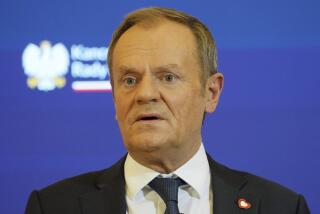Poland Offers Reform Plan That Stresses Profit Motive : New Program Calls for Letting Market Forces Influence Prices, Wages
- Share via
WARSAW — The Polish government Saturday presented to the Parliament a radical economic reform program that stresses lifting barriers to initiative, slashing bureaucratic power and letting market forces influence prices and wages.
The program amounts to a rejection of many of the economic mechanisms built up over the 42-year history of the Polish Communist state, and it is line with the restructuring taking place in the Soviet Union under Mikhail S. Gorbachev.
Premier Zbigniew Messner, who presented the program, told Parliament: “Soviet perestroika (reconstruction) has become a symbol here.”
Employing words and phrases that had long been considered derogatory, Messner declared: “Maximization of profit will pay off. . . . The pay of managers and all workers will be more dependent than today on the volume of profit.”
The reform plan contains echoes of Western capitalism, including a stock market for trading shares among enterprises and a bond market that would be open to individuals.
Messner said: “Not the form is essential but whether it all serves the socialist economy.”
Messner said the reforms also should persuade Western lenders to quickly restore trade credits to Poland. Credits dried up after the 1981 martial law crackdown on the Solidarity independent trade union movement.
In an unprecedented move, the Parliament called for a nationwide referendum Nov. 29 to let the people determine the “degree and rate” of the reform.
Addressing the Sejm, or Parliament, with Polish Communist Party leader Gen. Wojciech Jaruzelski looking on, Messner said the reform package would spur socialist enterprise on the principle that “everything which is not prohibited is permitted.”
He complained of a lack of vitality in Poland’s economy. Using an oft-repeated cynical remark on the efficiency of Soviet-style command economies, Messner said, “In extreme cases, the people pretend to be working and the enterprise pretends to pay them.”
A statement in the program declared: “Polish society is aware that (economic) potential is not properly used and is wasted, frequently forgetting that this is very often due to low productivity, bad quality and defective workmanship.”
Messner said one goal of the reform program is to activate the “immense latent capacity” of the Polish people.
The Sejm called a session for Oct. 23-24, when it is expected to ratify the package. Messner said the reforms would be implemented in 1988-90.
The reforms would make it much easier for individuals and enterprises to start new businesses or engage in foreign trade. It would reduce the number of government ministries, give plant managers greater decision-making powers and end centralized control of many enterprises.
Tax and subsidy policies would change so that the efficient enterprises would no longer wind up supporting inefficient ones, Messner said.
He spoke only generally about the need to raise prices, acknowledging that that is the most socially sensitive aspect of the plan.
Workers rose up against the state in 1956, 1970 and 1980 to protest price increases, and the government has been reluctant to hike prices again without a broad national consensus.
The program statement stressed that nothing would change unless the reforms received broad popular cooperation.
Messner said realistic pricing is essential to balance market supply and demand. Price increases would be mostly cushioned with higher pay and cost-of-living allowances, but there can be no real rise in wages without higher productivity, he said.
Deputy Premier Zdzislaw Sadowski, who is responsible for implementing the reforms, told a news conference later that prices could go up by more than 50% next year if the reform program was fully imposed immediately.
Sadowski said that 3,000 to 3,500 state workers, including about 90 high-level officials, would lose their jobs because of cutbacks in government ministries. Sixteen government ministries would be consolidated into eight new ministries, reducing the number from 26 to 18.
The new ministries would have less direct control over the economy than the departments they replace, Messner said, outlining a sharply reduced role for the bureaucracy.
“The role of the state should be boiled down to inspiring ventures and exercising control over whether they are being implemented in a lawful manner,” he said.
Messner said authorities should no longer be suspicious of some people doing better than others, and he called for an end to discrimination in pay for highly skilled people.
In Poland, professionals like doctors and engineers are near the bottom of pay scales. Construction workers and miners are among the highest paid.
In what could be seen as a threat to the party’s privileged elite--the nomenklatura-- the premier said that more managerial jobs should be given to non-party members.
Solidarity leader Lech Walesa said Saturday that he could not express an opinion on the speech before seeing detailed documents related to the reforms.
“But for the time being I do not see it as an earthquake,” he said. Government spokesman Jerzy Urban had used that term to describe the pending announcement.
The outlawed Solidarity union had said the proposed reforms are a move in the right direction but cannot succeed unless the government also allows free-trade unions and other independent social groups to counteract conservative resistance in the party apparatus.
Messner’s speech capped six months of discussion on how Poland is to get its economy moving again after years of stagnation, political upheaval and disappointment with milder reforms imposed in 1981.
More to Read
Sign up for Essential California
The most important California stories and recommendations in your inbox every morning.
You may occasionally receive promotional content from the Los Angeles Times.










